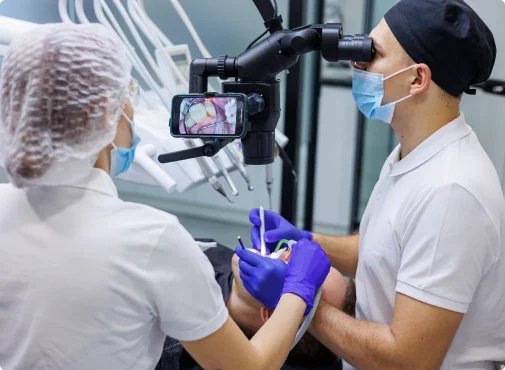Early Detection Saves Lives: Schedule Your Oral Cancer Screening Today!
When it comes to our health, prevention is key. And one area that requires regular attention is our oral health. As much as we hate going to the dentist, it’s vital to ensure that we’re keeping our teeth and gums in good shape. But what about oral cancer screenings?
An oral cancer diagnosis can have a devastating impact on your life. But catching it early can make a world of difference. That’s why Dr. Makani, an oral surgeon dentist in Chester Springs, offers oral cancer screenings as part of their routine exams. With this simple screening, Dr. Makani and their team at Eagle Family Smiles can identify any signs of oral cancer before it can spread.
For those in high-risk groups, such as smokers and heavy drinkers, getting an oral cancer screening is especially important. But even if you’re not in a high-risk group, it’s still recommended that you receive a screening at least once a year as part of your regular dental check-up.

At the Eagle Family Smiles, we understand the importance of early detection. And when you visit our office, you’ll be greeted by our friendly and compassionate staff. We know that going to the dentist can be a nerve-wracking experience for some people, so we do everything we can to make our patients feel comfortable and at ease.
If you’re looking for a family dentist in Chester Springs that offers comprehensive oral care, including oral cancer screenings, Dr. Makani is committed to providing affordable and compassionate care.
Oral cancer is a serious and potentially life-threatening condition that affects millions of people around the world. However, the good news is that with early detection, the chances of successful treatment and recovery are much higher. That’s why it’s important to be aware of the common symptoms of oral cancer and to schedule regular screenings with your dentist.
1. Swellings, lumps, or bumps on the lips, gums, or other areas inside the mouth
2. The development of white, red, or speckled patches in the mouth
3. Unexplained bleeding in the mouth
4. Numbness, pain, or tenderness in any area of the face, mouth, or neck
5. Sores on the face, neck, or mouth that bleed easily and do not heal within two weeks
6. Difficulty chewing or swallowing, speaking, or moving the jaw or tongue
7. Hoarseness, chronic sore throat, or a change in voice
8. Ear pain
9. Changes in the way teeth or dentures fit together
10. Dramatic weight loss without any known reason
If you experience any of these symptoms, it is important to seek prompt attention from a dental professional. Regular oral cancer screenings can help detect the disease early, when it is more treatable.
During your regular visit at Eagle Family Smiles, Dr. Makani will inquire about your medical history and any unusual symptoms you may have been experiencing. She will then conduct a comprehensive examination of your oral cavity, which includes your lips, cheek lining, gums, tongue, floor of the mouth, roof of the mouth, and the pharynx at the soft part of the roof of your mouth, tonsils, and back section of your tongue. Dr. Makani will also palpate your jaw and neck for any lumps or abnormalities.
At Eagle Family Smiles, we recommend that you visit us for your first Oral Cancer Screening. Based on your risk factors and any abnormalities that we may detect, we will advise you on how frequently you should undergo oral cancer screenings. As a high-risk patient, we may suggest annual screenings.
To reduce your risk of oral cancer, Dr. Makani recommends that you refrain from using smokeless tobacco products, which is the biggest historical risk factor for developing oral cancer. Additionally, limiting your alcohol consumption and sun exposure, as well as quitting all tobacco products, may help to prevent oral cancer. You should speak to your general physician to determine whether you are a candidate for the HPV vaccine or need to be tested for the virus.
The risk of developing oral cancer is not limited to older men, as previously thought. Research has shown that both men and women are susceptible to oral cancer, with smoking, alcohol consumption, and HPV infection being the primary risk factors. Dr. Makani recommends that all adults undergo oral cancer screenings, and if you smoke, drink alcohol regularly, or have the HPV virus, you should be particularly vigilant about screening.
At Eagle Family Smiles, we prioritize patient comfort, and there is typically little to no discomfort involved in an Oral Cancer Screening. However, if advanced oral cancer is detected, treatment may cause some discomfort.
Oral Cancer can affect any part of the mouth, including the lips, teeth, gums, tongue, floor and roof of the mouth, and the inside of the lips and cheeks. There are two categories of oral cancer: those that affect the oral cavity and those that affect the oropharynx, including the middle region of the throat, tonsils, and the base of the tongue.
Oral Cancer has four stages, ranging from stage 1 when the tumor is small and has not spread to any lymph nodes to stage 4 when the cancer has spread to other parts of the body. Oral Cancer screenings can detect “stage 0” cancer when cells have not yet become cancerous. Cancers caught in the earliest stages have the highest five-year survival rates. At Eagle Family Smiles, Dr. Makani conducts thorough Oral Cancer Screenings to detect any abnormalities in their earliest stages, increasing the chances of successful treatment.